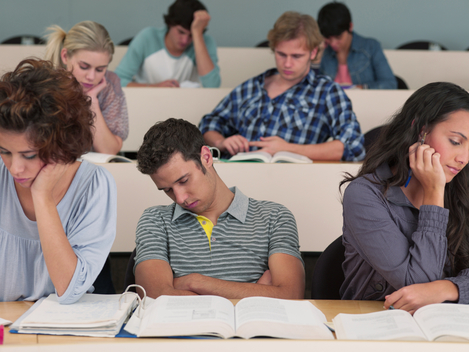Lack of Sleep in College Students: The Silent Threat to Well-Being and Performance
 Source: https://images.app.goo.gl/PytAfCBsrSJ6EZQr6
Source: https://images.app.goo.gl/PytAfCBsrSJ6EZQr6
In the fast-paced and demanding environment of college life, sleep often becomes a low priority for many students. Faced with a constant stream of deadlines, expectations, and mental strain, students frequently sacrifice rest in ways that feel harmless but are anything but. Balancing academic responsibilities, part-time jobs, social activities, and personal pressures leaves little room for adequate rest. Late-night study sessions, excessive screen time, and irregular routines only worsen the problem. However, what many students fail to realize is that sleep deprivation is not just a minor inconvenience; it is a silent threat with serious consequences. Lack of sleep negatively impacts mental health, weakens the immune system, reduces memory retention, and severely hinders academic performance. As the pressures of higher education continue to grow, recognizing the importance of healthy sleep habits is essential for maintaining overall well-being and achieving long-term academic success.
According to Schlarb, Fredrich, and Claßen (2017), around 60% of university students don’t get enough sleep, and 7.7% experience symptoms of insomnia, which can seriously affect their mental and physical health. A report by Newport Institute (2022), citing Sleep Cycle findings, highlights key causes: overuse of electronic devices that block melatonin due to blue light, limited exposure to natural sunlight disrupting the circadian rhythm, and low physical activity reducing sleep quality. Emotional struggles like anxiety, depression, and loneliness also worsen the issue by increasing sleep onset latency—the time it takes to fall asleep.
These factors become even more critical during exam periods. Suardiaz-Muro et al. (2023) found that final exams, with their intense academic pressure, often disrupt students’ sleep in both duration and quality. This affects cognitive functions like concentration, memory, and critical thinking needed for exams. As a result, academic performance may decline, causing frustration when outcomes don’t match the effort. Sleep loss during this time also increases stress and anxiety, and weakens the immune system—just when students need to be at their best mentally and physically.
To address this growing problem, college students can apply several practical strategies:
- Limit screen time before bed to prevent blue light from disrupting sleep hormones.
- Get regular sunlight exposure to maintain a healthy sleep-wake cycle.
- Stay physically active, but avoid intense exercise close to bedtime.
- Manage stress through relaxation or seek help for emotional challenges.
- Use campus resources and support groups to build healthy sleep habits.
Sleep deprivation poses a serious but often overlooked threat to the well-being and academic success of college students. While many students may view sacrificing sleep as a necessary trade-off for completing academic tasks or maintaining social lives, the long-term impacts are far-reaching. Chronic sleep loss disrupts cognitive functions such as concentration, memory, and problem-solving, while also taking a toll on physical health by weakening the immune system. As research by Hershner and Chervin (2014) has shown, high-stress periods like exams further exacerbate these issues, creating a vicious cycle of poor sleep, increased anxiety, and decreased performance. Recognizing the importance of sleep is not merely a matter of personal wellness; it is a critical component of academic resilience and success. Universities and support systems must encourage awareness and provide resources that promote healthy sleep habits, enabling students to function at their best both mentally and physically. Prioritizing sleep is ultimately a step toward a more balanced, effective, and fulfilling college experience.
References:
- Hershner, S., & Chervin, R. (2014). Causes and consequences of sleepiness among college students. Nature and Science of Sleep, 6, 73–84. https://doi.org/10.2147/NSS.S62907
- Newport Institute. (2022, January 11). The Mental Health Effects of Sleep Deprivation in College Students. Newport Institute. https://www.newportinstitute.com/resources/mental-health/sleep-disruption/
- Schlarb, A. A., Friedrich, A., & Claßen, M. (2017). Sleep problems in university students – an intervention. Neuropsychiatric disease and treatment, 13, 1989–2001. https://doi.org/10.2147/NDT.S142067
- Suardiaz-Muro, M., Ortega-Moreno, M., Morante-Ruiz, M., Monroy, M., Ruiz, M. A., Martín-Plasencia, P., & Vela-Bueno, A. (2023). Sleep quality and sleep deprivation: relationship with academic performance in university students during examination period. Sleep and biological rhythms, 21(3), 377–383. https://doi.org/10.1007/s41105-023-00457-1

